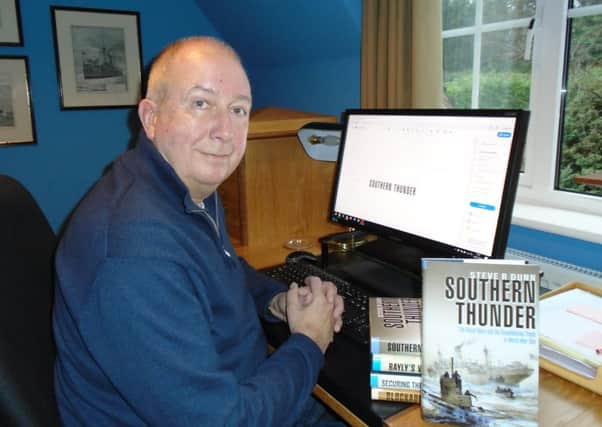Filey’s unsung heroes and brave acts feature in new World War One book


Now the centenary has passed, author and naval historian Steve Dunn believes there is a real danger that the First World War will begin to diminish in the public consciousness.
He says this means people will have to work even harder to ‘make sure we don’t forget’ - which is why he plans to carry on writing about those who lost their lives at sea in WW1.
Advertisement
Hide AdAdvertisement
Hide Ad“The war’s legacy still affects us today, good and bad, and it’s important that we continue to reflect upon it and think about peace,” said Steve.
“Also, for me it’s about turning the spotlight on the many unsung heroes and brave acts that largely went unnoticed.”
His seventh book, Southern Thunder, which is published this month, does just that.
For example, it covers details about the sinking of the yacht Mekong.
Advertisement
Hide AdAdvertisement
Hide AdThe unlikely warship had been requisitioned by the Admiralty in April 1915 and tasked with patrolling the Yorkshire coast between Humber and Berwick, looking for U-boats.
Ironically it wasn’t the Germans that caused the vessel a problem, it was the severe winter weather, which forced the Mekong to run onto the rocks a short distance from Filey Brigg.
The incident was covered by the Driffield Times on March 18, 1916, which described how the Filey coastguard, the Rocket Brigade and local lifeboat crew acting quickly, helping to save 42 lives. Without their support there’s little doubt that the death toll would have been greater than three.
“In many ways this story highlights the very best of the human spirit- from the lifeboat men and volunteers of St John’s Ambulance, who went from Scarborough to Filey to give aid, to the local people who provided dry clothes, hot food and kindness to the survivors.
Advertisement
Hide AdAdvertisement
Hide Ad“Two Gristhorpe dairymen literally left their cans of milk at the side of the road and drove to the site of the disaster to ferry the rescued men to safety,” said Steve, who is a member of The Society for Nautical Research and the Britannia Naval Research Association.
Southern Thunder includes many other stories of bravery, generally involving sailors that were responsible for protecting the Scandinavian convoys that sailed down the east coast of Britain to Hull.
He added: “This may not have captured the imagination of the public, who wanted a major sea battle like Trafalgar, but keeping the seas safe for British and Allied trade while blocking them off from Germany and its partners was critical to winning the war.”
In line with his previous books, several of which have been shortlisted for the prestigious Mountbatten Maritime Award, Steve uses detailed analysis and first-hand accounts from those who took part to create a vivid narrative and demonstrate how the Royal Navy helped to bring about Germany’s downfall and the Armistice.